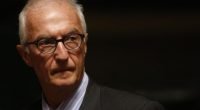‘State of rule of law suspended in Turkey, if not completely eliminated’

Date posted: March 2, 2014
İSTANBUL
“In a state of rule of law, first of all, the governing party itself would not allow such developments and would allow the process of law to work. Instead, the prime minister and the ruling party are resisting the regular course of rule of law,” said Ümit Kardaş, a retired colonel and former military judge.
Kardaş is among 150 academics who signed a manifesto titled “Rule of law suspended.” The manifesto says the AK Party government cannot ignore the corruption allegations just by making up claims of a “parallel state” and placing the blame on the Hizmet movement, which is inspired by Turkish Islamic scholar Fethullah Gülen, for its unlawful practices.
“Prime Minister Erdoğan does not allow the rule of law to work and defends himself just by saying there is a plot to unseat him,” Kardaş said, adding that preventing the judiciary to function is a criminal act, and could lead to the impeachment of Prime Minister Recep Tayyip Erdoğan in the future.
In addition, President Abdullah Gül approved a law on a contested bill tightening the government’s grip on the judiciary. The new law signed on Feb. 26, which sparked fistfights among politicians debating it in Parliament, will give the Justice Ministry greater control over the Supreme Board of Judges and Prosecutors (HSYK), an independent body responsible for appointing members of the judiciary.
Gül also approved a regulation tightening control of the Internet. Kardaş said that with such approvals, Gül has shown that he has been considerate of his political career, not the nation’s interests.
On this and more, Kardaş answered our questions.
President Gül approved a law tightening the executive control over the judiciary. Were you expecting Gül to sign it?
Before the president signed the Internet law, there was an expectation that he would act differently because there was the impression that he and Prime Minister Erdoğan had different views on many of the recent issues that were being debated in the country. Gül gave the impression that he was representing common sense and he was placing great value on protecting personal freedoms. Of course, there was a different political circumstance at the time that President Gül’s political future was uncertain as Erdoğan had an eye on that seat. Since the Gezi Park events, and increasingly after Dec. 17 when the corruption probe was made public, Erdoğan’s chances of becoming president have been decreasing. And it seems like President Gül will be president again, and the prime minister will continue his rule after removing the restriction on holding public office after two terms. President Gül’s behavior seems to signal such a reconciliation between Gül and Prime Minister Erdoğan. The decision to sign the two very controversial laws seems to be political on the part of President Gül.
He apparently had reservations on some of the articles of the law. When you look at the law, would changing or removing those articles influence the spirit of this law, which was designed to give powers to the executive to control the judiciary?
The problematic part of the new law is that it gives rights to the justice minister to decide in which chambers the members of the Supreme Board of Judges and Prosecutors [HSYK] will serve. Most important, the justice minister will be able to decide whether or not a probe can be started in relation to a judge; this is totally against the independence of judges. Who is going to decide on the acceptance of judges into the profession — their promotion and their oversight is important for independence of judges? The danger here is the executive’s likely pressure over judges. Increasing the justice minister’s powers to oversee issues related to judges’ independence is threatening for the independence of judges.
What was done in regards to that important issue with the law that was put to referendum on Sept. 12, 2010?
The justice minister’s powers over such issues regarding judges had been somewhat restricted to ensure the independence of judges. In European countries, there are institutions such as the HSYK, but their heads are symbolically either the head of the Supreme Court of Appeals or the president; no justice minister is involved in order to keep the executive powers outside. Members of the institution are selected usually by parliaments in European countries. In the United States, judges are elected in the states; the executive power appoints the Supreme Court judges; however, the executive power has no authority of inspection or promotion over judges after their appointment.
‘Ruling party resists course of rule of law’
As the Sept. 12 referendum somewhat restricted the powers of the justice minister over judges, new changes of the government have now given the justice minister control of the judges. Why has there been that U-turn?
This happened after the Dec. 17 corruption probe. If we had a normal, developed democracy, we would see resignations of people from the government whose names were involved in the probe. And then the judiciary process would start to work and we would wait for its results. Since we do not have such a culture of democracy, the government rejected the corruption allegations outright, removed the judges and prosecutors who initiated the investigation, and in order to prevent further probes, new judges and prosecutors close to the government have been appointed. All of this is the result that we do not have political ethics. The state of rule of law has been suspended in Turkey, if not completely eliminated. In a state of rule of law, first of all, the governing party itself would not allow such developments, and would allow the process of law to work. Instead, the prime minister and the ruling party is resisting the regular course of rule of law, and that’s why we are talking about whether or not some audio recordings [the most prominent one being an alleged conversation between Prime Minister Recep Tayyip Erdoğan and his son, Bilal Erdoğan, discussing how to “get rid of” large sums of money stashed in their homes and those of their relatives] are genuine or not.
In the past, you supported the AK Party government’s actions in regards to the removal of the military tutelage in Turkey. Are you remorseful for doing that or would you do the same if you knew the ruling party would turn out to be this way at the end?
I am not remorseful for doing that. If there is again a move to unseat this government by ways of the military, I would be against it because we have to overcome all of our difficulties via democratic means; we know what harm military regimes caused. I supported the government on its course to eliminate the military tutelage — by the way, it has not been totally eliminated — because there were “red lines” of the military, which were explained by the military itself, in front of the democratic development of Turkey. We [liberals] expected that the democratic development of Turkey would have been realized with increased rights and freedoms, and the Kurdish issue would have been resolved. However, this is not what happened. A new constitution to guarantee increased rights and freedoms could not be made. Prime Minister Erdoğan started to become an authoritarian leader, and tended to micromanage business and other affairs in an increasing way after the Sept. 12 referendum. Our expectations were fizzled out; we were disappointed. Today, we are at a point where there is not democratic development but going backwards, in which there is dirty business, and we have lost our direction toward democracy and productivity. Of course, there is also a power fatigue that has been causing this because the government has been in power for more than two terms. Turkey’s biggest handicap is that there are no alternative political choices in front of people.
‘Expect early elections, if not turmoil’
How do you evaluate the candidates of the main opposition Republican People’s Party (CHP) in this regard?
I can speak only for İstanbul, and the CHP’s candidate for mayor of İstanbul, Mustafa Sarıgül, is a controversial name because he was ousted from the CHP in the past because of corruption allegations. This move damages the CHP’s credibility. Historically, the CHP is a state party, and because there are no social democratic parties in Turkey, it presented itself as one, even though it is neither social nor democratic. In a normal democracy, the CHP would be a marginal party with only a small percentage of votes. However, having no alternatives makes it prominent. This is how the AK Party is presenting itself, too; it says that there are no alternatives so you have to elect me again!
You said that the military tutelage system has not been totally eliminated in Turkey. Would you elaborate on this?
There have not been any structural or ideological or mentality changes made in the institutions of the military in order to prevent the military tutelage. In 1970, with a law, all authorities of the Defense Ministry were given to the General Staff, which is an autonomous body. All problematic institutions, such as the military’s judiciary, privileges of the General Staff, autonomous General Staff, etc., are in place. Those institutions are not transparent. If this government had democratic tendencies, if should have eliminated the National Security Council [MGK], the military court of appeals and the military supreme administrative court. And the MGK made a dire decision recently by targeting the Hizmet movement and showing it as a national security threat. Those actions are repetitions of what military regimes did.
Where is Turkey heading?
We can expect early elections. After the March 30 local elections, we will see what will happen. If there are no early elections and the prime minister continues with this type of authoritarian attitude, this could lead to turmoil in the society — we have seen the example of Ukraine.
‘No Hizmet judges or prosecutors taking over’
You have been in the business of law for years. Have you observed any organizational movements within the judiciary of what Erdoğan calls a “parallel state” in regards to the Hizmet movement?
I’ve been in the military judiciary for years and I haven’t observed anything like it, and I haven’t observed it in the civilian judiciary, either. This claim is in regards to the special courts. Remember what was being told by the prime minister before the Sept. 12 referendum about the HSYK and the Supreme Court of Appeals that their members were either pro-status quo or Alevis or neo-nationalists! Now we have another phenomenon, the parallel state! The Ergenekon and Balyoz cases were prepared and seen by prosecutors and judges of the HSYK. Let’s not forget that the history of the judiciary has some dark pages: First, we had the İstiklal Courts [in the period between 1920 and 1927. The İstiklal Courts, the so-called Independence Courts, were mainly committing acts of brutality by persecuting people who criticized the practices of the republican era regime]; then we had courts of the martial law regime; then we had State Security Courts [DGMs]; and then special courts replacing the DGMs. Judges of those courts act depending on the conjecture, the requirements of the era; no rule of law can be expected. Nobody expected that the lack of rule of law could have a boomerang effect. If there was a parallel state — as claimed by the prime minister — within the state, why did he bring it up only after the Dec. 17 probe but not before? The prime minister loses his reliability in this regard. There should have been a judicial process if there was such a “parallel state.” The Hizmet movement has been investing in education and it could have encouraged its followers to be in positions of high authority in the judiciary, but we cannot know who is from Hizmet, who is an Alevi or Kurd in those positions. We have to see that in Turkey, the system has unjustly treated Kurds, Alevis, religious orders, etc., and in order to survive, those groups try to take up positions of high authority.
‘We can no longer expect fair trial processes’
In my last Monday Talk, journalist Hasan Cemal said Erdoğan knows that the corruption allegations are serious and in order to get out of this situation, he needs to find excuses and the “parallel state” claim is part of this; otherwise, Erdoğan might find himself in an impeachment court. Do you agree?
I agree that Erdoğan does not allow the rule of law to work and defends himself just by saying that there is a plot to unseat him. About the impeachment, it would not be possible if the prime minister stays as the prime minister because there is voting needed to start an investigation about the prime minister in Parliament and his party has the majority. But if he falls from power, his impeachment might become possible; this would not be just because of the corruption allegations but because his interference into the constitutional order has been great — preventing the judiciary to work is a criminal act.
Can we expect that there are still honest and respectable members of the judiciary, judges and prosecutors who will act ethically and conduct fair investigations?
No, we cannot expect that; we should have stopped expecting that since Dec. 25 when a prosecutor ordered the police to detain people based on court decisions, and the police did not abide by it. It was over at that point. And, we individuals, citizens, can no longer expect fair trial processes. It will also be normal to expect that the police will act arbitrarily, because the police have this impression that it has a right not to abide by court rules.
PROFILE
Ümit Kardaş
After graduating from İstanbul University Faculty of Law in 1971, he became a military judge in 1975 and earned his juris doctorate (JD) degree in 1985. He worked in the Turkish Armed Forces as prosecutor, judge and judicial counsel. He was also a Diyarbakır martial law military prosecutor in 1980-1981 and retired in 1995 to practice law and publish books, articles and op-eds. His books include “Hukuk Devlete Sızabilir mi?” (Can Law Infiltrate the State?), “Hakim Bağımsızlığı Açısından Askeri Mahkemelerin Kuruluşu ve Yetkileri” (Establishment of Military Courts and their Powers from a Perspective of Judicial Independence), “Türkiye’nin Demokratikleşmesinde Öncelikler” (Priorities in Turkey’s Democratization), “Askeri Ceza ve Ceza Yargısı” (Military Criminal Procedure) and “Disiplin Mahkemeleri Kuruluşu Yargılama Usulü ve Disiplin Suç ve Cezaları Hakkında Kanun” (Law on the Establishment of Disciplinary Courts, Trial Procedure and Discipline Offenses and Penalties). Kardaş has also published compilations of poetry. He is currently teaching law at Fatih University, and writes commentaries in Taraf daily.
Source: Todays Zaman , March 2, 2014
Tags: Democracy | Freedoms | Hizmet (Gulen) movement | Turkey |
























